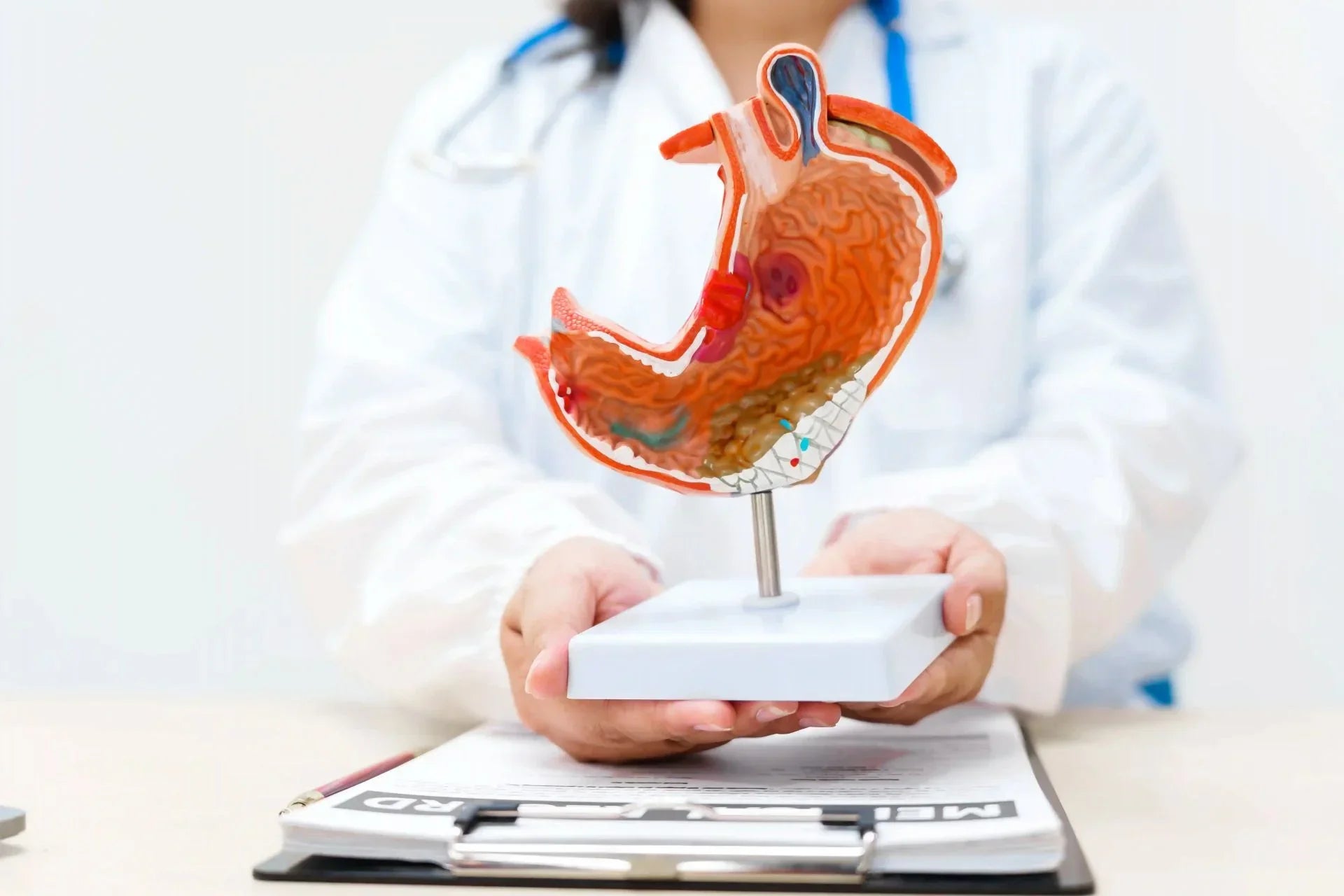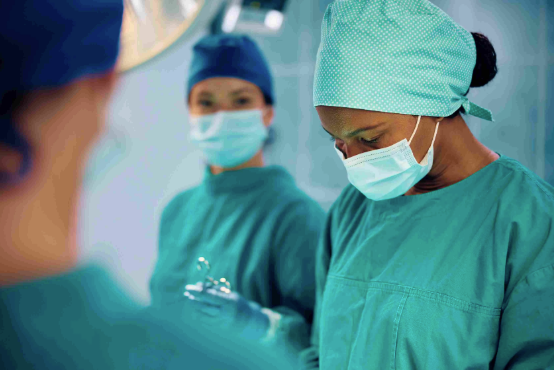How to reduce gas after bariatric surgery?
Written by: Laura Arantegui / Date: 31-10-24 / Reading time: 5 Minutes
Bariatric surgery is a powerful tool for weight loss and the control of obesity-related pathologies. However, one of the common side effects after this type of intervention is the appearance of gas, which can cause discomfort and affect patients' quality of life. Understanding the causes of this phenomenon and how to manage it is essential for an optimal recovery and a better adaptation to the new eating routine.

Table of Contents
- 1. Causes of gas after bariatric surgery
- 2. Strategies to manage and reduce gases
- 3. Common symptoms associated with post-surgery gases

Causes of gas after bariatric surgery
Changes in the anatomy of the digestive system:
After bariatric surgery, the digestive system undergoes changes that can affect the normal process of digestion and absorption of food.
The reduction in the size of the stomach and, in some cases, the alteration of the small intestine, can cause food not to be completely digested before reaching the colon, where intestinal bacteria ferment it, producing gas.
In addition, inadequate secretion of pancreatic enzymes after surgery can cause poor digestion of fats and proteins.
Alterations in the intestinal flora:
The intestinal microbiota may be altered after surgery due to changing pH levels in the stomach and in some areas of the intestine, contributing to excessive gas formation.
Dietary modifications and the consumption of antibiotics during and after the procedure may change the composition of the microbiota, enhancing gas production.
Consumption of certain foods and beverages:
Some foods, such as high-fiber foods, legumes, and dairy products, are known to increase gas production. In addition, carbonated beverages can introduce air into the digestive system, increasing the amount of gas in the intestine.
Surgical techniques:
In some bariatric techniques such as gastric bypass, a blind pocket is generated where bacterial overgrowth (SIBO) can occur, causing non-specific digestive symptoms such as abdominal pain, bloating, increased flatulence and diarrhea to manifest.
Strategies to manage and reduce gases
Eat slowly and chew food well:
The speed at which food is eaten has a direct impact on gas formation. Eating slowly and chewing food well facilitates digestion and reduces the amount of air swallowed, which can reduce gas production.

Supplements that help you reduce gas:
There are specific supplements, with plant extracts and probiotics, that can be useful in managing gas. Plant extracts have carminative, antispasmodic, and microbiota-protective effects, while probiotics can balance the microbiota, reducing fermentation and thus gas production.
Stay hydrated with water instead of carbonated beverages:
Water is the best option for staying hydrated after bariatric surgery. Carbonated beverages can increase the amount of gas in the stomach and intestine, which can aggravate bloating and discomfort.
Foods that produce flatulence:
There are some foods that can cause excess gas in the intestine causing intestinal spams and abdominal distension, such as:
-Vegetables : cucumber, artichoke, broccoli, mushrooms, garlic, leek, etc.
-Fruits : pineapple, apple, watermelon, banana, grapes, plums, etc.
-Legumes
-Dairy products
- Coffee and tea
-Foods with high sugar content
-Excess carbohydrates
-Chocolate and chewing gum
- Redwine , beer and carbonated beverages

Common symptoms associated with post-surgery gases
Abdominal swelling:
The feeling of bloating is common and is usually the result of a buildup of gas in the digestive system. It can be particularly uncomfortable after bariatric surgery, when the stomach is smaller and more sensitive.
Stomach pain and discomfort:
Gas may cause abdominal pain and a general feeling of discomfort. This may be especially noticeable in the first few weeks after surgery, as the body adapts to the changes in the digestive system.
Frequent belching and flatulence:
Belching and flatulence are the body's natural mechanisms for releasing excess air and accumulated gas. However, after bariatric surgery, these symptoms may be more frequent and uncomfortable.
In conclusion, adopting proper eating habits, using specific supplements and maintaining good hydration are key strategies to minimize this uncomfortable side effect. If symptoms persist, it is advisable to consult your physician for personalized guidance.
Bibliographic references
Ciobârcă D, Cătoi AF, Copăescu C, Miere D, Crișan G. Bariatric Surgery in Obesity: Effects on Gut Microbiota and Micronutrient Status. Nutrients. 2020 Jan 16;12(1):235. doi: 10.3390/nu12010235. PMID: 31963247; PMCID: PMC7019602.
2. Woodard GA, Encarnacion B, Downey JR, Peraza J, Chong K, Hernandez-Boussard T, Morton JM. Probiotics improve outcomes after Roux-en-Y gastric bypass surgery: a prospective randomized trial. J Gastrointest Surg. 2009 Jul;13(7):1198-204. doi: 10.1007/s11605-009-0891-x. Epub 2009 Apr 18. PMID: 19381735.
3. Chen JC, Lee WJ, Tsou JJ, Liu TP, Tsai PL. Effect of probiotics on postoperative quality of gastric bypass surgeries: a prospective randomized trial. Surg Obes Relat Dis. 2016 Jan;12(1):57-61. doi: 10.1016/j.soard.2015.07.010. Epub 2015 Jul 18. PMID: 26499352.
4. Ramos MRZ, de Oliveira Carlos L, Wagner NRF, Felicidade I, da Cruz MR, Taconeli CA, Fernandes R, Filho AJB, Campos ACL. Effects of Lactobacillus acidophilus NCFM and Bifidobacterium lactis Bi-07 Supplementation on Nutritional and Metabolic Parameters in the Early Postoperative Period after Roux-en-Y Gastric Bypass: a Randomized, Double-Blind, Placebo-Controlled Trial. Obes Surg. 2021 May;31(5):2105-2114. doi: 10.1007/s11695-021-05222-2. Epub 2021 Jan 14. PMID: 33443719.
Other supplements that will help you in your bariatric post-operative period
Frequently asked questions about gas after bariatric surgery
See other related articles:









